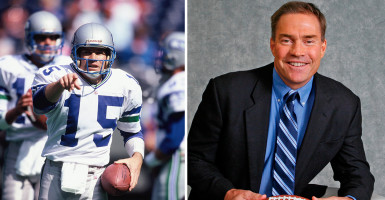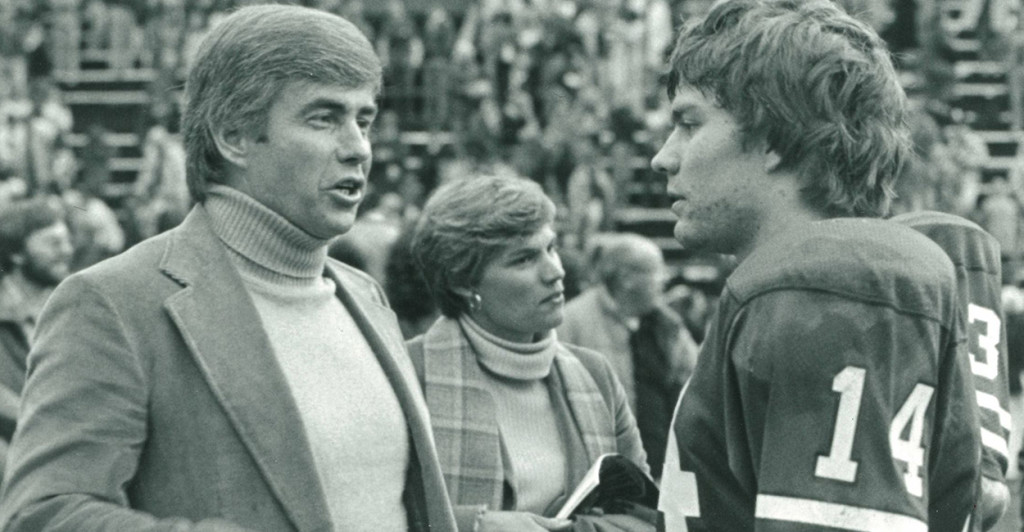“I got my big chance to be a starting quarterback with the Seattle Seahawks, and in one half of play against the 49ers, my old team, I stunk it up,” says Jeff Kemp, unfazed by the callused heartache he now accepts as mere fact.
“I got booed, we got booed, and I got benched. I went from first string to third string in one half of football, and was pretty much relegated to the bench the rest of the year.”
It was the late eighties, and Kemp, who had bounced around the rosters of the then-Los Angeles Rams and San Francisco 49ers before being traded to the Seahawks, was watching his football dreams fade. He was shocked.
“I had never played really poorly in my whole life,” says Kemp, whose father Jack Kemp was also a professional quarterback for various NFL teams before launching a successful political career. The Kemps were the first of only six NFL father-son duos in the history of pro football.
“My job kind of went down the drain in 30 minutes of football. Not to mention, it’s not fun to be booed by 55,000 people,” Kemp says with a small laugh. “Everyone except your wife, and you don’t even have a witness on that.”
After eleven seasons—and seven concussions—as an NFL quarterback, Kemp retired. He is now the vice president of the marriage and family advocacy group FamilyLife.
That experience makes him perhaps particularly well-positioned to speak about recovering from both on-the-field and metaphorical “blitzes,” or the football play wherein extra defensemen are called upon to rush the quarterback.
“The blitz is the most dangerous, but also most opportunistic, moment in football games,” Kemp says. The idea that real or perceived failure can breed success is one of the main premises behind Kemp’s new book of culled insight and life advice, “Facing the Blitz.”
Kemp says that fumbling in front of a packed stadium taught him a valuable, albeit humbling, lesson: “Life doesn’t only go from good to bad,” he says, “but also from bad to good.”
“That was one of the biggest blitzes I had faced up to that point [in my life], and it sent me to a deeper level of faith,” Kemp says, referring to the end of his football career. “I realized I had wrapped too much of my identity up in, ‘Do I play good football?’ and ‘Will I be a starter?,’ and when that all went away, I had to fall back on something deeper, and I did.”
Kemp began taking stock of his life’s accomplishments and re-evaluated his career aspirations. He shifted his focus to his family life and his Christian faith. Several years later, he founded Stronger Families, a non-profit organization devoted to promoting faith-based marriages and, as its name implies, strong families, through relationship and educational programs in Seattle.
“I remembered that at the end of the day, I’m not a football player,” Kemp says. “I’m a son, a husband, a father, and I’m a child of God.”
Eighteen years after founding Stronger Families and working tirelessly to build up the company, he faced another blitz.
“I had run a non-profit which was a strong, good organization in Seattle,” he says. “We basically hit a financial crunch right at the end of the Great Recession, and we ran so low on donations that we were really in debt and not able to recapitalize.”
Kemp says he was again reminded that his identity did not lie within his career or success as a businessman. He made the difficult decision to walk away from a company he calls his “baby,” resigning and leaving it in the hands of its current leadership. According to Kemp, the Stronger Families mission statement has been narrowed, and the company is now rebuilt and thriving, focusing specifically on military families.
“Handling that blitz [with Stronger Families], and facing it head on, telling the truth to our board and donors and not making it about me, that set me free for the next chapter of my life, which was more national,” Kemp says.
Kemp found work in Little Rock, Ark., and packed up his family to move over 2,000 miles across the country, where he assumed his current leadership role with FamilyLife. He says he gets to do “more of what he’s good at” in his new role, including booking national speaking engagements.
Kemp hopes his book’s message will resonate with football fans and neophytes alike, noting that blitzes are often a universally challenging but necessary part of life.
“You can’t say that it’s a better chapter now that my son passed away, or my parent passed away. That obviously is a scar and a wound and a pain that people will always carry with them,” Kemp says. “But if going through that cancer or losing that loved one allowed you to recalibrate your life to become someone who makes a mark on other people’s lives and makes their lives better, who looks at the long term and grows their faith, it is for the good.”































